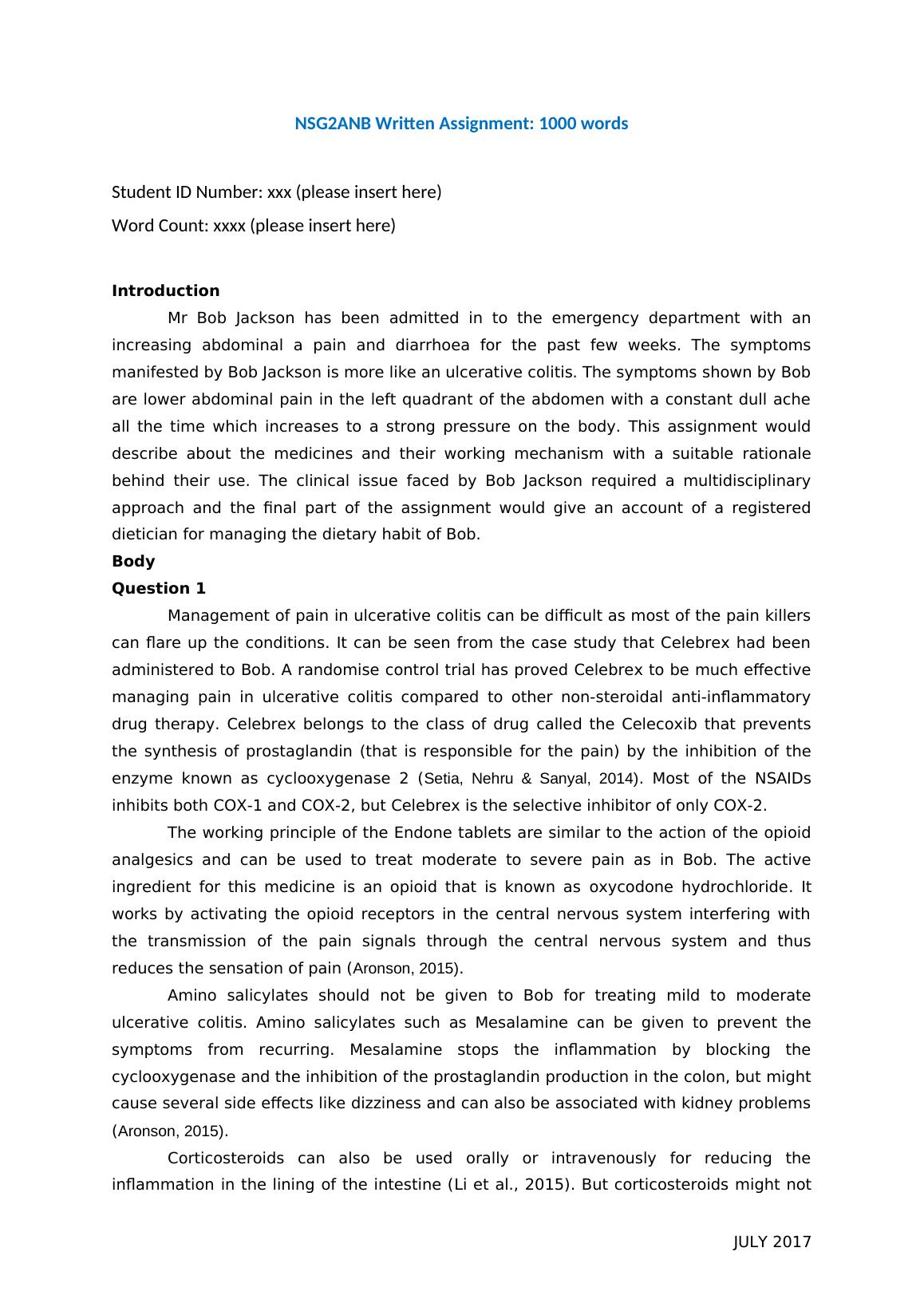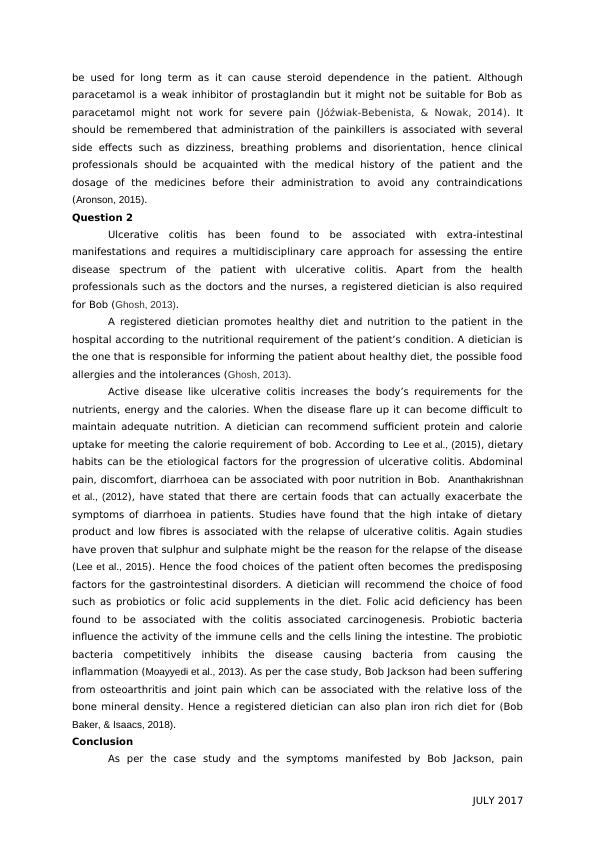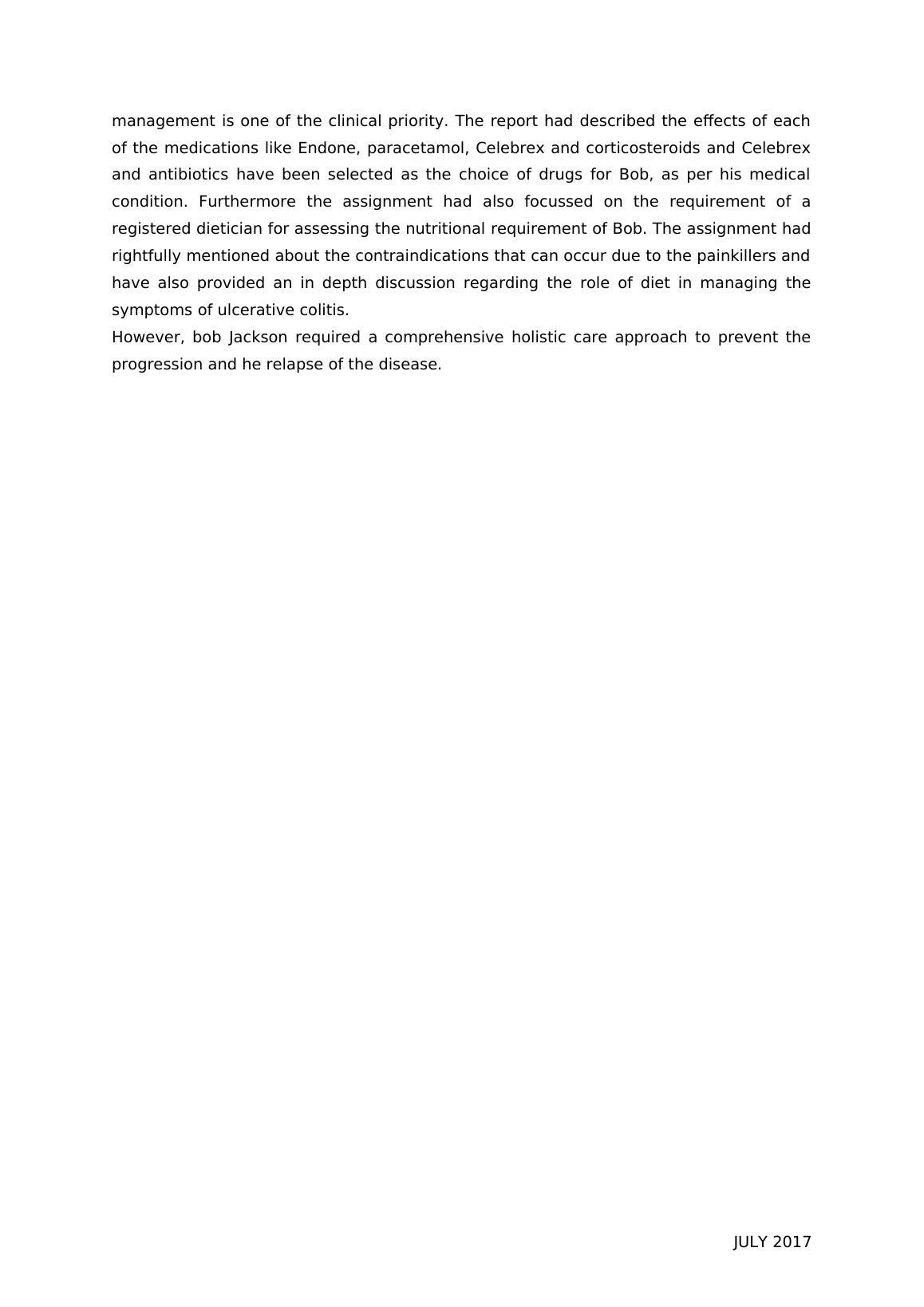Management of Pain and Nutritional Requirement in Ulcerative Colitis: A Case Study
Added on 2023-06-03
6 Pages2411 Words305 Views
NSG2ANB Written Assignment: 1000 words
Student ID Number: xxx (please insert here)
Word Count: xxxx (please insert here)
Introduction
Mr Bob Jackson has been admitted in to the emergency department with an
increasing abdominal a pain and diarrhoea for the past few weeks. The symptoms
manifested by Bob Jackson is more like an ulcerative colitis. The symptoms shown by Bob
are lower abdominal pain in the left quadrant of the abdomen with a constant dull ache
all the time which increases to a strong pressure on the body. This assignment would
describe about the medicines and their working mechanism with a suitable rationale
behind their use. The clinical issue faced by Bob Jackson required a multidisciplinary
approach and the final part of the assignment would give an account of a registered
dietician for managing the dietary habit of Bob.
Body
Question 1
Management of pain in ulcerative colitis can be difficult as most of the pain killers
can flare up the conditions. It can be seen from the case study that Celebrex had been
administered to Bob. A randomise control trial has proved Celebrex to be much effective
managing pain in ulcerative colitis compared to other non-steroidal anti-inflammatory
drug therapy. Celebrex belongs to the class of drug called the Celecoxib that prevents
the synthesis of prostaglandin (that is responsible for the pain) by the inhibition of the
enzyme known as cyclooxygenase 2 (Setia, Nehru & Sanyal, 2014). Most of the NSAIDs
inhibits both COX-1 and COX-2, but Celebrex is the selective inhibitor of only COX-2.
The working principle of the Endone tablets are similar to the action of the opioid
analgesics and can be used to treat moderate to severe pain as in Bob. The active
ingredient for this medicine is an opioid that is known as oxycodone hydrochloride. It
works by activating the opioid receptors in the central nervous system interfering with
the transmission of the pain signals through the central nervous system and thus
reduces the sensation of pain (Aronson, 2015).
Amino salicylates should not be given to Bob for treating mild to moderate
ulcerative colitis. Amino salicylates such as Mesalamine can be given to prevent the
symptoms from recurring. Mesalamine stops the inflammation by blocking the
cyclooxygenase and the inhibition of the prostaglandin production in the colon, but might
cause several side effects like dizziness and can also be associated with kidney problems
(Aronson, 2015).
Corticosteroids can also be used orally or intravenously for reducing the
inflammation in the lining of the intestine (Li et al., 2015). But corticosteroids might not
JULY 2017
Student ID Number: xxx (please insert here)
Word Count: xxxx (please insert here)
Introduction
Mr Bob Jackson has been admitted in to the emergency department with an
increasing abdominal a pain and diarrhoea for the past few weeks. The symptoms
manifested by Bob Jackson is more like an ulcerative colitis. The symptoms shown by Bob
are lower abdominal pain in the left quadrant of the abdomen with a constant dull ache
all the time which increases to a strong pressure on the body. This assignment would
describe about the medicines and their working mechanism with a suitable rationale
behind their use. The clinical issue faced by Bob Jackson required a multidisciplinary
approach and the final part of the assignment would give an account of a registered
dietician for managing the dietary habit of Bob.
Body
Question 1
Management of pain in ulcerative colitis can be difficult as most of the pain killers
can flare up the conditions. It can be seen from the case study that Celebrex had been
administered to Bob. A randomise control trial has proved Celebrex to be much effective
managing pain in ulcerative colitis compared to other non-steroidal anti-inflammatory
drug therapy. Celebrex belongs to the class of drug called the Celecoxib that prevents
the synthesis of prostaglandin (that is responsible for the pain) by the inhibition of the
enzyme known as cyclooxygenase 2 (Setia, Nehru & Sanyal, 2014). Most of the NSAIDs
inhibits both COX-1 and COX-2, but Celebrex is the selective inhibitor of only COX-2.
The working principle of the Endone tablets are similar to the action of the opioid
analgesics and can be used to treat moderate to severe pain as in Bob. The active
ingredient for this medicine is an opioid that is known as oxycodone hydrochloride. It
works by activating the opioid receptors in the central nervous system interfering with
the transmission of the pain signals through the central nervous system and thus
reduces the sensation of pain (Aronson, 2015).
Amino salicylates should not be given to Bob for treating mild to moderate
ulcerative colitis. Amino salicylates such as Mesalamine can be given to prevent the
symptoms from recurring. Mesalamine stops the inflammation by blocking the
cyclooxygenase and the inhibition of the prostaglandin production in the colon, but might
cause several side effects like dizziness and can also be associated with kidney problems
(Aronson, 2015).
Corticosteroids can also be used orally or intravenously for reducing the
inflammation in the lining of the intestine (Li et al., 2015). But corticosteroids might not
JULY 2017

be used for long term as it can cause steroid dependence in the patient. Although
paracetamol is a weak inhibitor of prostaglandin but it might not be suitable for Bob as
paracetamol might not work for severe pain (Jóźwiak-Bebenista, & Nowak, 2014). It
should be remembered that administration of the painkillers is associated with several
side effects such as dizziness, breathing problems and disorientation, hence clinical
professionals should be acquainted with the medical history of the patient and the
dosage of the medicines before their administration to avoid any contraindications
(Aronson, 2015).
Question 2
Ulcerative colitis has been found to be associated with extra-intestinal
manifestations and requires a multidisciplinary care approach for assessing the entire
disease spectrum of the patient with ulcerative colitis. Apart from the health
professionals such as the doctors and the nurses, a registered dietician is also required
for Bob (Ghosh, 2013).
A registered dietician promotes healthy diet and nutrition to the patient in the
hospital according to the nutritional requirement of the patient’s condition. A dietician is
the one that is responsible for informing the patient about healthy diet, the possible food
allergies and the intolerances (Ghosh, 2013).
Active disease like ulcerative colitis increases the body’s requirements for the
nutrients, energy and the calories. When the disease flare up it can become difficult to
maintain adequate nutrition. A dietician can recommend sufficient protein and calorie
uptake for meeting the calorie requirement of bob. According to Lee et al., (2015), dietary
habits can be the etiological factors for the progression of ulcerative colitis. Abdominal
pain, discomfort, diarrhoea can be associated with poor nutrition in Bob. Ananthakrishnan
et al., (2012), have stated that there are certain foods that can actually exacerbate the
symptoms of diarrhoea in patients. Studies have found that the high intake of dietary
product and low fibres is associated with the relapse of ulcerative colitis. Again studies
have proven that sulphur and sulphate might be the reason for the relapse of the disease
(Lee et al., 2015). Hence the food choices of the patient often becomes the predisposing
factors for the gastrointestinal disorders. A dietician will recommend the choice of food
such as probiotics or folic acid supplements in the diet. Folic acid deficiency has been
found to be associated with the colitis associated carcinogenesis. Probiotic bacteria
influence the activity of the immune cells and the cells lining the intestine. The probiotic
bacteria competitively inhibits the disease causing bacteria from causing the
inflammation (Moayyedi et al., 2013). As per the case study, Bob Jackson had been suffering
from osteoarthritis and joint pain which can be associated with the relative loss of the
bone mineral density. Hence a registered dietician can also plan iron rich diet for (Bob
Baker, & Isaacs, 2018).
Conclusion
As per the case study and the symptoms manifested by Bob Jackson, pain
JULY 2017
paracetamol is a weak inhibitor of prostaglandin but it might not be suitable for Bob as
paracetamol might not work for severe pain (Jóźwiak-Bebenista, & Nowak, 2014). It
should be remembered that administration of the painkillers is associated with several
side effects such as dizziness, breathing problems and disorientation, hence clinical
professionals should be acquainted with the medical history of the patient and the
dosage of the medicines before their administration to avoid any contraindications
(Aronson, 2015).
Question 2
Ulcerative colitis has been found to be associated with extra-intestinal
manifestations and requires a multidisciplinary care approach for assessing the entire
disease spectrum of the patient with ulcerative colitis. Apart from the health
professionals such as the doctors and the nurses, a registered dietician is also required
for Bob (Ghosh, 2013).
A registered dietician promotes healthy diet and nutrition to the patient in the
hospital according to the nutritional requirement of the patient’s condition. A dietician is
the one that is responsible for informing the patient about healthy diet, the possible food
allergies and the intolerances (Ghosh, 2013).
Active disease like ulcerative colitis increases the body’s requirements for the
nutrients, energy and the calories. When the disease flare up it can become difficult to
maintain adequate nutrition. A dietician can recommend sufficient protein and calorie
uptake for meeting the calorie requirement of bob. According to Lee et al., (2015), dietary
habits can be the etiological factors for the progression of ulcerative colitis. Abdominal
pain, discomfort, diarrhoea can be associated with poor nutrition in Bob. Ananthakrishnan
et al., (2012), have stated that there are certain foods that can actually exacerbate the
symptoms of diarrhoea in patients. Studies have found that the high intake of dietary
product and low fibres is associated with the relapse of ulcerative colitis. Again studies
have proven that sulphur and sulphate might be the reason for the relapse of the disease
(Lee et al., 2015). Hence the food choices of the patient often becomes the predisposing
factors for the gastrointestinal disorders. A dietician will recommend the choice of food
such as probiotics or folic acid supplements in the diet. Folic acid deficiency has been
found to be associated with the colitis associated carcinogenesis. Probiotic bacteria
influence the activity of the immune cells and the cells lining the intestine. The probiotic
bacteria competitively inhibits the disease causing bacteria from causing the
inflammation (Moayyedi et al., 2013). As per the case study, Bob Jackson had been suffering
from osteoarthritis and joint pain which can be associated with the relative loss of the
bone mineral density. Hence a registered dietician can also plan iron rich diet for (Bob
Baker, & Isaacs, 2018).
Conclusion
As per the case study and the symptoms manifested by Bob Jackson, pain
JULY 2017

management is one of the clinical priority. The report had described the effects of each
of the medications like Endone, paracetamol, Celebrex and corticosteroids and Celebrex
and antibiotics have been selected as the choice of drugs for Bob, as per his medical
condition. Furthermore the assignment had also focussed on the requirement of a
registered dietician for assessing the nutritional requirement of Bob. The assignment had
rightfully mentioned about the contraindications that can occur due to the painkillers and
have also provided an in depth discussion regarding the role of diet in managing the
symptoms of ulcerative colitis.
However, bob Jackson required a comprehensive holistic care approach to prevent the
progression and he relapse of the disease.
JULY 2017
of the medications like Endone, paracetamol, Celebrex and corticosteroids and Celebrex
and antibiotics have been selected as the choice of drugs for Bob, as per his medical
condition. Furthermore the assignment had also focussed on the requirement of a
registered dietician for assessing the nutritional requirement of Bob. The assignment had
rightfully mentioned about the contraindications that can occur due to the painkillers and
have also provided an in depth discussion regarding the role of diet in managing the
symptoms of ulcerative colitis.
However, bob Jackson required a comprehensive holistic care approach to prevent the
progression and he relapse of the disease.
JULY 2017

End of preview
Want to access all the pages? Upload your documents or become a member.
Related Documents
Acute Nursing: Treatment of Ulcerative Colitis Symptoms and Role of Registered Dieticianlg...
|7
|1627
|276
Case Study on Acute Illness: Medication and Multidisciplinary Teamlg...
|7
|1626
|205
